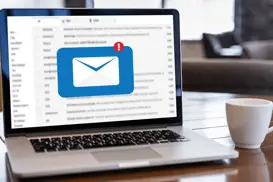The Importance of Sending Interview Rejection Letters
An Interview Rejection Letter is a formal communication from a company to a job candidate who was interviewed but not chosen for a position, serving to communicate the decision and provide feedback if available.
Throughout the hiring process, sending an interview rejection letter professionally and courteously informs candidates they weren't selected. In this article, Aniday emphasizes the Interview Rejection Letter concept and its importance.
What Is an Interview Rejection Letter?

An Interview Rejection Letter is a written notification sent from a company to a candidate after they have participated in an interview but were not selected. This letter usually includes a rejection message along with relevant information.
The Interview Rejection Letter is not just a routine task in recruitment but also an opportunity to leave a positive impression of the company and ensure that the company's reputation remains unscathed. Here are some benefits that an interview rejection letter can bring:
-
Creating a Positive Impression of the Company: The rejection letter shows respect for the candidate and their time.
-
Providing an Explanation to the Candidate: The rejection letter can help the candidate understand why they were not selected, offering insights that can aid in future job searches.
-
Protecting the Company's Reputation: A professionally written rejection letter can help the company avoid negative perceptions from candidates.
Basic Content of an Interview Rejection Letter
An interview rejection letter typically contains the following elements:
-
Expression of Gratitude and Appreciation for the Candidate
Start the letter by thanking and expressing appreciation to the candidate for their time and effort in the interview.
-
Notification of the Rejection
In this section, the company should provide a specific reason for the rejection. However, sensitive details should be avoided to protect the candidate's dignity.
-
Words of Encouragement and Suggestions for Future Opportunities
Provide words of encouragement to the candidate and suggest that they continue seeking other opportunities, whether within the company or elsewhere.
-
Proposal to Retain Candidate Information for the Future
Recommend keeping the candidate's information for consideration for future positions.
-
Signature and Contact Information
Conclude the letter with a signature and contact information to allow the candidate to get in touch if necessary.
Additional Considerations for Writing an Interview Rejection Letter

1. Writing the Rejection Reason Respectfully and Professionally
When writing the rejection reason, it's essential to focus on elements that the candidate lacks or doesn't meet the position's requirements. For instance, you can mention the candidate's lack of experience or necessary skills.
Here are some key points to keep in mind when writing the rejection reason:
-
Focusing on Relevant Factors: Employers should focus on candidates' deficiencies related to the position, like lacking experience in a relevant field or essential skills.
-
Expressing Respect: Employers should show respect to candidates, even if not chosen, by acknowledging their potential and expressing a desire for future collaboration.
-
Avoiding Negative Remarks: Employers should avoid making negative comments about the candidates. This can lead to disappointment and discomfort for the candidates.
2. How to Encourage the Candidate After Receiving the Letter?
Candidates may feel disappointed upon receiving a rejection letter. Therefore, it is crucial to provide words of encouragement and motivation in the letter, showing respect and appreciation. Here are some ways to encourage candidates after they receive the rejection letter:
-
Express Regret: Employers should express regret for not being able to select the candidate for the position. This will make the candidate feel valued.
-
Wish the Candidate Success in the Future: Employers should wish the candidate success in their future endeavors. This will help the candidate feel optimistic and motivated to seek new opportunities.
-
Suggest Retaining Candidate Information: Employers can suggest retaining the candidate's information for future consideration if there are suitable positions. This will make the candidate feel appreciated and give them a chance to be considered for other positions in the future.
Besides the mentioned essentials, employers should also take into account the following aspects when composing an interview rejection letter:
-
The rejection letter should be professional and polite.
-
The rejection letter should be sent as soon as the company has made a decision.
-
The rejection letter should be sent to the correct recipient.
-
The rejection letter should be carefully reviewed before being sent.
Sample Interview Rejection Letter
Dear [Candidate's Name],
We appreciate your time and interest in the [Job Title] role at [Company Name]. Your skills and experience left a positive impression, and we value the effort you invested in the interview process.
Regrettably, after thorough evaluation, we have chosen another candidate whose experience and skills better align with the position's requirements.
We regret that we could not extend the job offer to you. We encourage you to persist in your job search and wish you success in discovering new opportunities ahead.
Should you have any queries, please don't hesitate to reach out to us.
Sincerely,
[Your Name]
[Your Title]
[Company Name]
Conclusion
Aniday hopes that this article provides valuable insights into how to handle the process of interview rejection correctly. If you are a candidate who has received an Interview Rejection Letter, don't be disheartened; instead, stay confident and learn from the experience to improve your performance in future interviews.
Aniday's HR Services
Headhunting Service
Find and recruit quality candidates in just 1 week! Supported by 40,000 experienced headhunters in IT, Finance, Marketing… capable of recruiting in any region.
Headhunting Service ➔Employer of Record (EOR) Service
On behalf of your business, we recruit employees and handle payroll without the need to establish a company in markets such as Vietnam, Singapore, Malaysia, India, Indonesia…
Employer of Record (EOR) Service ➔
